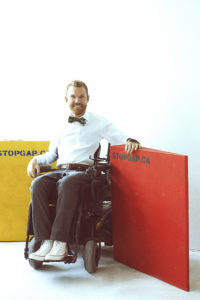Marina’s Picks is a regular feature from CanadaHelps CEO, Marina Glogovac, highlighting some of the many charities she is personally passionate about. As a champion for smaller charities, Marina wants to help fellow Canadians discover some of the lesser known organizations that are working to make our communities better.

Below is an interview between Marina Glogovac and Luke Anderson, Founder and Executive Director of StopGap Foundation. This interview has been briefly edited for length and clarity.
MG: What does StopGap Foundation do and what’s unique about it?
LA: StopGap helps communities discover the benefits of barrier free spaces and provides support to create them. We are known for our iconic Ramp Project — the super bright, deployable ramps can be placed anywhere there is a need. StopGap ramps solve single step access issues, it’s a go-to solution for landlords, home owners, building managers and renters of venues that have barriers to entry. Barriers are disabling for many populations — parents with strollers, delivery people, the elderly. At some point in our lives we will all experience a shift in how we move around our communities, whether it’s because we become parents, sustain an injury, or our mobility changes due to the natural aging process. Consequently we need to ensure there are accommodations in place so we can navigate with maximum independence and spontaneity regardless of ability.
MG: I appreciated the ramps personally as a mother, and now I am part of the aging group. I recently broke my wrist, and I’m extra careful now. I worry about tripping and falling and so I’ve come full circle appreciating the ramps.
MG: How did StopGap Foundation begin?
LA: It all began when I had spinal cord injury. I was a gifted athlete and I sustained a high level injury during a cycling crash. In a split second, how I related to the world changed. I was introduced to a new world and to new frustrations. The world isn’t well designed for someone who uses a wheelchair. The built environment is full of physical barriers. I’m not able to access many concert venues or go to restaurants with my friends — many small venues and restaurants don’t have ground level access, and washrooms are often in the basement. I’m not able to live my life with the independence or spontaneity that I knew before needing to use a wheelchair to get around.
I was a structural engineer for 8 years, and ironically even at my place of work there were barriers. I had to rely on someone to enter and exit the building. We had a heavy metal ramp and each time it was deployed, I noticed that others benefited from the barrier free entry. The ramp was appreciated by parents with strollers and delivery people with carts.
So with that spark of inspiration, in 2011 my coworker and I built the first StopGap ramp, along with 12 others and kicked off an awareness and ramp distribution campaign in the Junction neighbourhood of Toronto. Business owners initially said they didn’t want a ramp, “none of my customers use wheelchairs.” There is so much ignorance around the importance of access and StopGap works to educate and help rid this ignorance. Creating accessible and inclusive spaces adds value to businesses. Equal access is a human right.
I thought this was just a one off, but StopGap has grown to support communities across Canada and we registered as a Canadian charity in 2013. I’ve left my engineering job and now work full time as Executive Director of the Foundation. We’ve learned a lot since we first started and have developed some exciting programs that help raise awareness about barriers in our built environment. We engage with communities to work towards removing these barriers.
MG: How has COVID-19 impacted your work?
LA: COVID-19 has had tremendous impact on me, both personally and professionally. Physical distancing doesn’t work for me — I rely on hands-on help.
For StopGap Foundation, many of our activities — corporate workshops, school presentations, interacting with business owners and community engagement — involve connections with humans and that can’t happen at this time.
Our revenue has also taken a big hit. Our fall annual fundraiser, our biggest source of unrestricted funding for general operations, took a hit but it’s pushed us to innovate and grow. This new reality has exposed some of our cracks. Because our programming has been put on pause, we’ve had time to re-evaluate what we are doing and shift how we operate. We’ve made changes to our back-end systems, our operations, and how we fundraise. Streamlining our work has helped close the cracks the pandemic has exposed.
We’ve had to be nimble and learn quickly to implement other means. I’ve strengthened my skill-set in the fundraising department. In the past, asking for money is something I’ve shied away from. I avoided the awkward phone calls. But people have responded when I share where we are at and what we need. I’ve realized it can be lucrative to be open and honest about our struggles.
MG: What’s something people wouldn’t know about your organization from the outside?
LA: I want to help people understand that our built environment is often more disabling than the disability itself. Spaces can disable individuals. Spaces with barriers hold us back. The design of environments we inhabit often don’t consider people with disabilities and acknowledge our unique, and equally valuable lived valuable experiences. The world is designed for an able-bodied 5’9″ male that weighs 175lbs. Offices are air conditioned and set at 21 degrees as the standard temperature that is comfortable for males in suits. Product design, and the spaces in which we live, work learn and play don’t fit all people.
The Accessibility for Ontarians with Disability Act (AODA) was passed into law in 2005. The aim of AODA is to have a fully accessible Ontario by 2025.
StopGap ramps are just the beginning. We begin the conversation with the front step, and then we move inside. Everything from text size on menus, the way aisles are spaced, to customer service and codes of conduct all need re imagining. Accessible washrooms are a big barrier and an expensive barrier to fix, so we encourage connections between businesses to help those without an accessible washroom become aware of businesses that do. We pave the way for innovative solutions, and build community by educating businesses so they will direct customers appropriately when accommodations are required.
 I encourage you to check out and support this inspirational charity that is working so hard to support the community it works in. Learn more about StopGap Foundation on their website, or make a gift through their CanadaHelps Charity Profile.
I encourage you to check out and support this inspirational charity that is working so hard to support the community it works in. Learn more about StopGap Foundation on their website, or make a gift through their CanadaHelps Charity Profile.
Leave a Reply